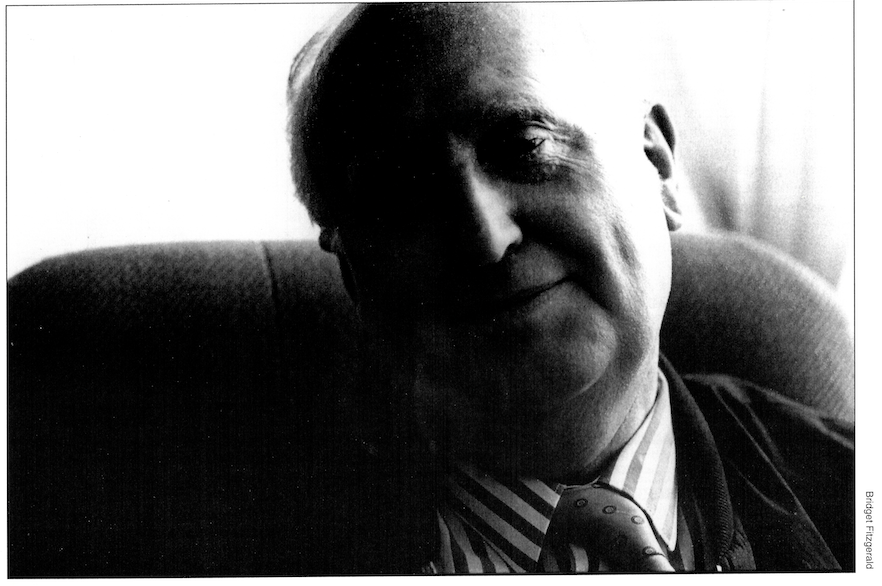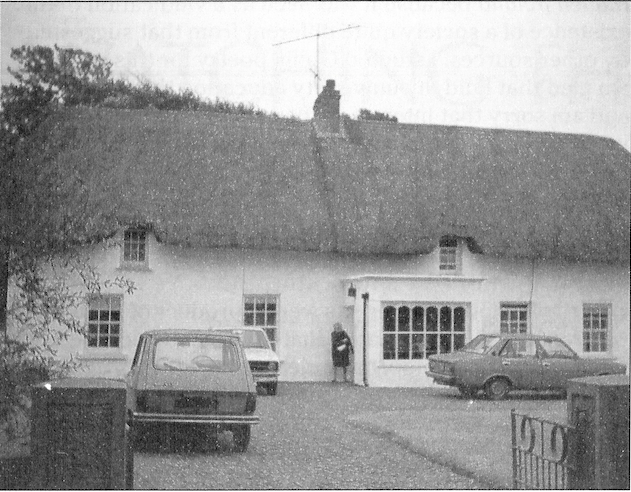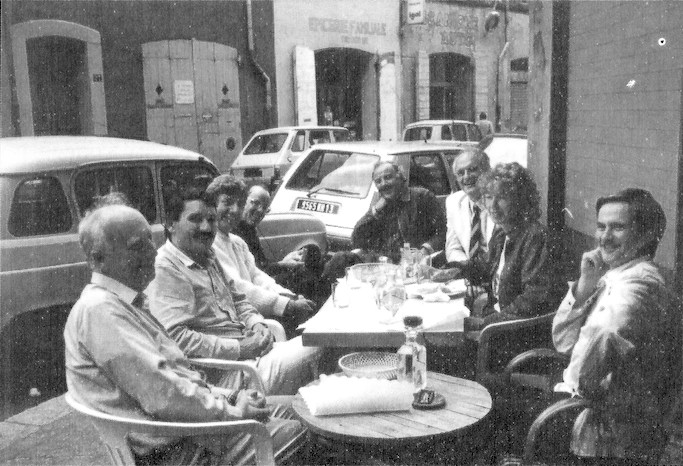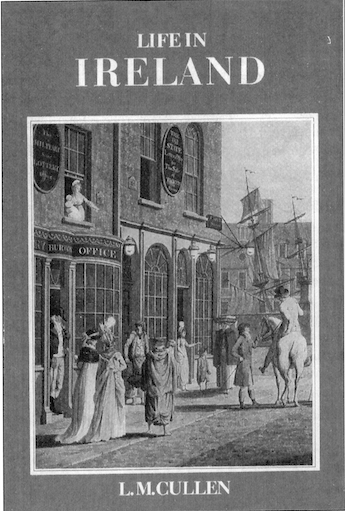
Professor L.M. Cullen of Trinity College, Dublin is among the most prolific and wide-ranging of Irish historians, and one of the most highly regarded internationally. His earlier work defined the mainstream of Irish economic history. More recently he has been active in cultural history, and in particular in re-interpreting the 1798 rebellion.
Kevin Whelan talked to him recently.
KW: What influenced you initially to become a historian?
LMC: My becoming a historian was due to accident or ignorance. When I went to university in Galway I wished to study languages but because of my unorthodox or largely self-taught language education I had to discontinue them after first year, and went into history and economics instead. At graduate level my linguistic interests led Sheila Kennedy to suggest trade with France as a topic — and that in turn led to an enduring interest in both Irish and French history. I have regretted not having persisted with my interest in foreign languages, the languages themselves more than their literature.
KW: How influential was your family background in shaping your later interests?
LMC: I am always glad that I had at various times the experience of both a small-town and a rural life when I was growing up, which made me very aware of many aspects of Irish life. On my father’s side we were builders, based in New Ross: on my mother’s side, farmers at Poulrane near Kilmore. That background made it difficult for me later to agree in conversations with people like Moody that rural Ireland at large was marked by insecurity. My experience of the countryside was of a secure, permanent base, or of a rural Ireland unrecognisable in the terms it was painted by historians. That sense has stayed with me as an influence throughout my life. As a boy, I also lived for three years on the edge of Castlepollard, an estate village; that may explain my later fixation with estate villages, as it left a very strong impression on me. Another impression I had from both New Ross and Castlepollard was the extent of the religious gulf in Ireland—marked by a peculiar tolerance and a disconcerting remoteness.

KW: What people had the greatest influence on your career?
LMC: The people who affect one most are one’s teachers. I owe a big debt to Sheila Kennedy, my Galway supervisor, and to Arthur John and Donald Coleman of the London School of Economics. As a young man, I was greatly taken by the work of Labrousse and of T.S. Ashton. Ashton was an admirable historian and an admirable man, a warm north of England person, who had spent the first world war as a school teacher in Dublin, and who retained a lively regard for the years he spent here. I now think that Labrousse’s approach was fatally flawed in its narrowness and economic determinism
KW: Your interests seem to have shifted in recent years towards cultural and political history and away from economic history. Why is this?
LMC: In my formative years in the 1950s I shared the view that economic history was central and that it could answer almost every question. The optimism was misplaced. If you answer one question to your own satisfaction, it simply leads to other questions. In my case, my work on the Irish economy challenged the old view that it was a distorted economy; in some respects it functioned quite well as an economy. One then has to look elsewhere to explain the persistence of tensions within that society. There is also the sense that all fashions are cyclical. The old tendency was to look at economic issues rather narrowly, but political thought and policy cannot be ignored. Many historians tried to banish these concepts but they have a crucial place which in the end has got to be accepted. So this is my recantation from the arrogance of both my youth and my generation of economic historians.
KW: You have constantly stressed regional and familial connections as pivotal to understanding the evolution of Irish society. Why is this?
LMC: In a sense I was transferring the Namierite approach from the political to the cultural context. People operate in harmony or in conflict with their family, their region or their religious background. That approach can degenerate into antiquarianism, but to understand economic policy or political developments it is essential to study the interaction between people at the family and regional level. People belong to interest groups, and not just in terms of economic benefit. Affection and enmity are vital motivating forces and can only be expressed in terms of people within one’s immediate vicinity.
KW: Was the fact that you studied through Irish responsible for your interest in Corkery’s Hidden Ireland?
LMC: Not really. I was led into analysing Corkery’s Hidden Ireland because it was seen as a vindication of the existence of a society quite different from that suggested by other sources. I studied Gaelic poetry for this reason. I am glad that I did my university education through Irish and am sorry that interest in the language has declined. It is distressing that undergraduates now are unwilling or incompetent to read Irish language material.
KW: Where did your interest in international history come from?
LMC: My foreign interests were a product of my work on Franco-Irish trade. Later, that intensified because of awareness of the important role that careers abroad played in the preservation and development of the comfortable families of urban and rural Ireland. I also became a francophile; in my student days I read widely in French literature, something of which I am not guilty with respect to any other language. And overseas trade is a valuable vehicle for studying not only many facets of society but these facets seen in two distinct cultural or geographical contexts.
KW: How would you assess your initiatives in collaborative work with Scottish and French historians?
LMC: I thought that comparative history of this type would yield greater results than it did. You can only engage in real comparative history if you are equally at home with the history of the two countries in question—and that asks too much of individual historians. The Scottish volumes were the more successful because the two countries are on the same scale; the French volumes pose problems because they compare a small society with a larger and hence more varied one. But I do think the conferences and volumes have made historians more aware of work in each other’s countries and helped them to avoid making facile or simplistic comparisons.

KW: Where did your recent interest in Japan, even to the extent of learning Japanese, come from?
LMC: When I commenced lecturing in Trinity College, I started a course on economic development which was then little taught, and that got me interested in Japan. When visiting professors and students started coming in the early 1970s, I learned an appreciation of what Japanese life was like from them. And Japanese is not a difficult language to learn—it has only six, arguably only two, irregular verbs—although it has a difficult writing system. Once you become aware that Japan is an extraordinary phenomenon, and that it was so centuries before 1869, then it is absolutely vital to read the languageto understand it. It was always a highly developed country and intellectual thought was also freer than has been admitted. It was a sort of ancien régime France, arbitary but enlightened
KW: What is your favourite history book?
LMC: Stephen Kaplan’s on the French grain trade is marvellous; on one level it is a thorough explanation of the subject in hand, but on another, it shows an ability to see through eighteenth-century French discourse which no French or English historian has quite matched. As a model for introducing someone to history I would recommend T.S. Ashton. He carried his learning lightly and his books were simple and effective in conveying their message. I also have an on-going fasination, possibly a love-hate one, with both Lecky and Froude
KW: What is your favourite among your own many books?
LMC: The work of every historian dates, and dates badly. This is a fundamental fact that we all have to face about our work. Given that, Life in Ireland offers a sense of my work as a historian. But, just like any research student, I see work in progress as of great significance at some moments and at others as drab and humdrum.

KW: What about your work on the French brandy trade?
LMC: The manuscript, dealing with the seventeenth and eighteenth centuries, is finished, but is I am afraid too long. Either it will have to be reduced (leaving much of the large Irish dimension out) or it may have to be divided into two books.
KW: How do you see the social role of the historian?
LMC: History has a significant role in society and for that reason history is very properly not confined to historians. Any literate person is entitled to be heard with respect on any history book. Some professional historians are too inclined to see history as a form of discourse in which they pursue views of their own on nationalist, religious or Anglo-Irish themes. That is not history in my view. History is a set of hypotheses to explain complex social realities; these hypotheses are never perfect and will constantly shift. In that sense the historian’s position is a rather unhappy one. Like a detective, a historian has a large casebook of unsolved cases. Discourse is dangerous in history because it suggests a certainty that the reader is then expected to endorse. History should be more like the detective’s business; one has then to accept that colleagues may be able to re-interpret the clues more convincingly. I also think it is unfortunate if historians have no experience of working in other jobs, if they go straight from graduate school into university teaching.
KW: Where do you stand on the ‘revisionism’ debate?
LMC: Revisionism in history is a form of discourse and hence revisionism of any sort is to be avoided like the plague. I would prefer to get back to the humbler version of the historian-as-detective. At one stage Keynes upbraided economists for their arrogance and suggested that they should instead approach their work with the same modest attitude as dentists—to pull teeth efficiently without attitude.
KW: How do you see Irish history writing developing in the future?
LMC: The emphasis will be more on political history but not in the arid narrow form against which Marc Bloch so strongly and so fruitfully reacted in the 1920s. It will be political history more broadly contextualised in cultural, intellectual and regional terms.
KW: You are the most prolific writer of your generation of historians. How do you do it?
LMC: When I left the diplomatic service, it was to devote myself to research and teaching history. I have always kept that in mind and tried to shed administrative commitments where possible, except for my work in the Irish Manuscripts Commission, and in the development of archives, which absorbed a considerable amount of time for the best part of two decades. But writing is also a form of occupational therapy and it keeps me out of mischief.
